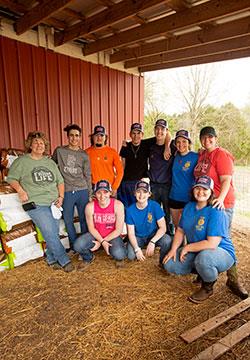 |
|
|
 |
 |
|
|
| |
|
Strength from struggle
FFA students at Mt. Juliet Christian Academy learn farming grit in tornado aftermath
| Story and photos by: Hannah Nave |
4/24/2020 |

Students and staff in the MJCA program include, kneeling, from left, Amelia Lions, Savannah Brewer, and Callie Neville, and standing, from left, Renee Tanner, Gavin Misuraca, Russell Prater, Dylan Boehm, Jack Pyburn, Clara Eck, and Brittany Barnett.
|
|
|
|
1
of
4
|
|
|
view all thumbnails for this gallery |
The morning of Tuesday, March 3, was devastating for many people across Middle Tennessee. An EF3 tornado ripped through the state and tore apart homes, businesses, and schools.
Several counties in the region reported damage to schools and educational facilities, but Wilson County was among those hardest hit. Two schools were destroyed, and many others were severely damaged, including Mt. Juliet Christian Academy.
Along with major damage to its library and athletics, MJCA’s agriculture education program also sustained significant loss.
“We lost everything,” says the school’s FFA Advisor Brittany Barnett, who teaches veterinary science, small animal care, and agriscience. “All our supplies are gone or damaged: fencing, blowers, clippers, all equipment.”
MJCA is one of two private schools in Tennessee with an FFA program. The chapter began in 2018 with 24 students and four sheep. This year, the program has 50 active members and 16 sheep.
“We showed sheep for the first time last year, and then we bred them,” says Barnett. “We got to lamb out our own babies, and the students got to learn about around-the-clock care. I let them get in there and learn all they could. It has been an incredible experience. Now that they have been through this, they don’t need to be monitored and mentored as closely; they can care for their sheep on their own.”
Barnett says that has been more beneficial than ever because of the situation after the storm.
“We’re operating at two different farms right now, and I can’t be in two places at once,” she says. “It’s nice to know that the kids have mastered several animal care practices because of the different programs and activities at school and FFA. Right now, they’re diagnosing issues and making decisions for themselves about the sheep. It makes my heart so full that I have been able to pay it forward.”
Barnett’s students have been very active in the recovery and progression of the program since the storm. Russell Prater, a junior at MJCA, says he was the first to help out.
“Only 30 minutes after the tornado came through, my friend and I were on campus trying to see the damage,” says Prater. “Because of blocked roads and downed transformers my advisor couldn’t get to campus, but several of us students managed to get to the animals. When we arrived, we saw they were all doing fine, except for one escaped goat. It was crazy to see the school destroyed, but all the animals in the building were okay.”
Barnett credits the community, especially the staff at Wilson Farmers Cooperative, for helping with her FFA program’s recovery efforts.
“[The kids] keep looking to each other and me to see what the next step is,” says Barnett. “But our Co-op keeps stepping up and saying, ‘It’s ok, we’ve got you. We are going to help you through this.’ That’s not uncommon. They have helped us the whole time. Without our Co-op, we wouldn’t be standing where we are.”
Renee Tanner, an employee at Wilson Farmers Co-op, says she is proud of the school’s agriculture program because of the high-quality students it has developed and how much they have grown.
“After my daughters were no longer showing, I offered their sheep to the program,” says Tanner. “And for the last couple of years, I have gone down to the school and taught them how to dock tails, castrate, and perform other routine practices. We have tried to help them get anything they need, or we have improvised.”
Although the students haven’t been able to return to the classroom because of COVID-19, they’re continuing to help with the care of the ag program’s animals.
“It hasn’t been much of a break at all because we still have so much stuff to do,” says Savannah Brewer, who serves as second vice president for MJCA’s FFA chapter. “We have to take care of the animals. Their needs do not stop just because we’re not at school.”
“You have to remember these aren’t ag kids — most are from the suburbs,” Tanner explains. “As farmers, we should take our time to share the message and help them understand what we do and why.”
This experience, says Barnett, is helping her students understand first-hand the responsibilities farmers take on as providers of the world’s food, fiber, and fuel.
“Through the tornadoes and global pandemic, people are seeing that food isn’t made in a store,” says Prater. “I hope they are seeing that farmers are out there doing what they have to do to get food to the shelves. I think people will have more appreciation for farmers instead of taking their food for granted.”
Thoughts like that are among the goals of the program, stresses Barnett.
“We hope we are providing students with a better understanding of where their food comes from in a hands-on way,” she says. “I’m hopeful for the future of the program and have faith it will return and be better than ever because it truly is all about the kids.
|
|
|
 |
|
 |
|
|
 |
|
  |
|